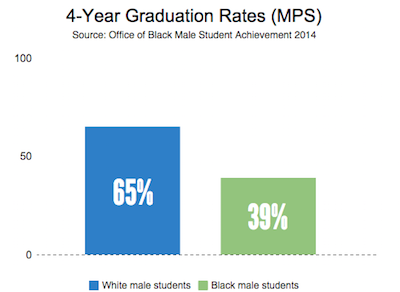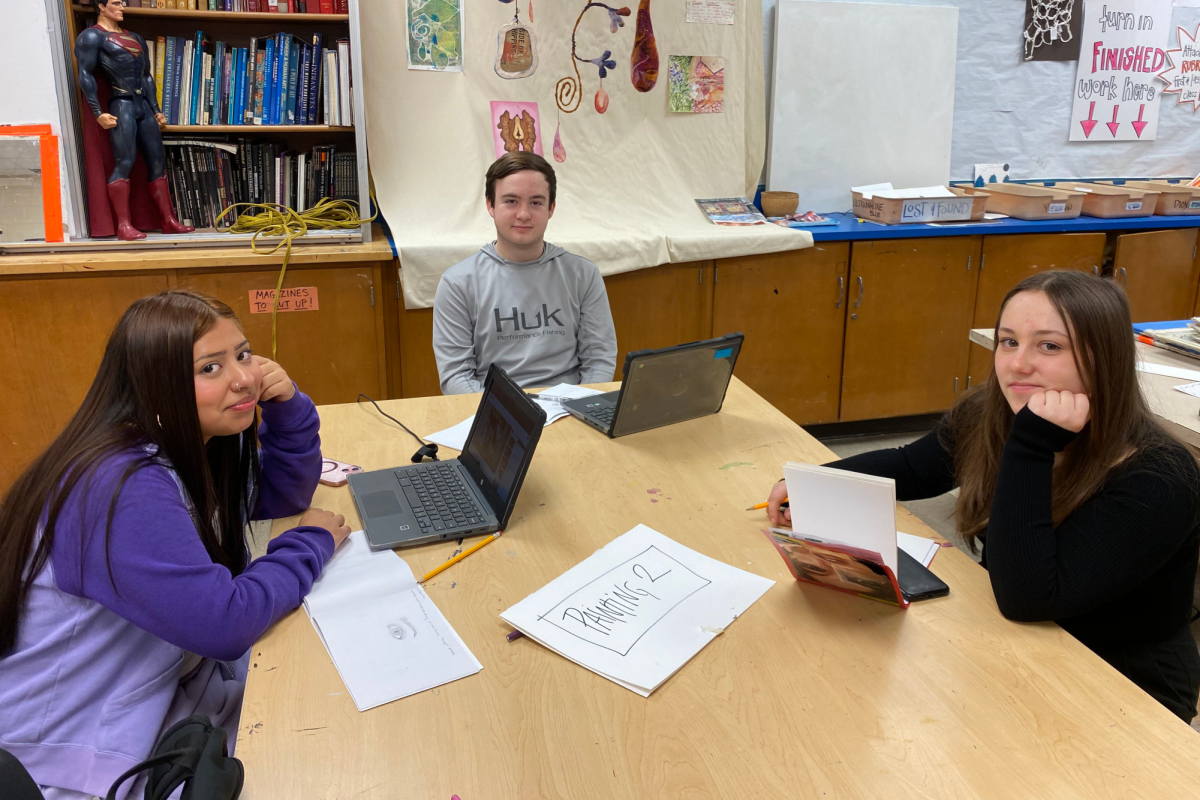African American male students find community in B.L.A.C.K. course
Teacher Corey Yeager instructs senior Malik Overton and other students in the B.L.A.C.K. course, a new class at South created for African American male students. According to Yeager, the goal of the course is, “to have young men who are coming out more aware and more conscious of who they are in the context of broader society.”
October 20, 2015
“It sounded pretty nice- a class of just people like me,” Antonio Haskell, a sophomore, recounted on the time when he first heard about the B.L.A.C.K. course.
B.L.A.C.K., which stands for Building Lives Acquiring Cultural Knowledge, is a new class at South developed by and designed for African American males.
Having existed as a program that met once a week last year, this is the first year B.L.A.C.K. has been offered as a course students can get credit for. The curriculum includes African American history, discussions, sharing autobiographies, tutoring, and college visits.
“We really are focused on having the young men look at who they are in the context of the education system, who they are in the context of the community, and who they are in the context of the broader United States community,” Corey Yeager, the teacher of the B.L.A.C.K. course at South discussed the focus of the class. “Who are we as a civilization of Africans that are now living in America? Who are we in the context of discrimination and oppression? What mindset have we developed about ourselves in the context of all of these different positions?” Yeager continued.
The Minneapolis Public School District’s Office of Black Male Student Achievement created the B.L.A.C.K. program in 2014. On their website, the Office describes themselves as, “a new department dedicated to accelerating academic strategies and narrowing the achievement gap.”
The Office reports that in 2014, 39% of black male high schoolers in the district graduated, while 65% of white male students in the district did the same. In addition, 13% of all black males in the district were suspended at least once compared to 2% of their white male counterparts. “The degree to which racial disparities continue to persist in MPS is unacceptable,” the Office declares.
Yeager, who previously worked as a therapist at Roosevelt, had a large role in creating the curriculum for the class along with the OBMSA.
“We hear all the time that this achievement gap that is in place for African American males’ underachievement in ACT scores, overachieving in referrals and expulsions. They’re top of the list for negatives, bottom of the list for positives,” Yeager explained. “This course was developed, and the Office was developed to really hone in with a laser focus on centralizing the focus on African American males and closing that gap and closing those major issues.”
Students discussed a variety of intentions behind the class.
“The purpose of the course, to me, is to know more about African American history,” Devveon Brannon, a sophomore and student in the B.L.A.C.K. class said. “We learn different stuff … that we didn’t learn before in any other class,” Brannon expanded. “I started seeing [African American] history in a different way.”
“What I got the most out of was the Malcolm X piece,” Brannon stated, describing how Malcolm X and Martin Luther King, Jr. had differing views of peace and violence during the Civil Rights movement. Brannon added that the knowledge he has gained in the B.L.A.C.K. course has given him confidence to speak up in social studies about history that isn’t being taught.
Yeager echoed Brannon’s views about African American history in academic settings. “[African American adolescents have] heard the same stories every year since they were in grade school,” Yeager said, referencing Rosa Parks and Martin Luther King, Jr. “To some degree, what that means is, we start to believe that our history began in slavery.” Yeager emphasized the self esteem that comes from delving into stories that have been left out, such as the history of leaders, kings, and queens in African civilizations.
Capryce Johnson, a sophomore and student in the course, mentioned how he has learned “how to verbally stand up and talk in front of a lot of people.” Johnson described that, “before I got into this class, I was kind of scared to talk on camera and in front a lot of people.” Haskell also brought up the speaking skills he’s developed through the course.
The class often involves discussion and sharing personal stories with one another. “I, as a teacher, share my autobiography with the class and then in turn, each of the members of the class share their own autobiography,” Yeager described. “We can have shared experience and learned experience from … the journey that we’ve had to arrive at the places and spaces that we are.”
“I’m a black male and I find [the students’] story not too different from my story,” Londel French, a Special Education Assistant at South stated. French often visits the B.L.A.C.K. classroom as a mentor. “[The class] gives [African American male students] a place to come and talk and be themselves. A lot of the teachers that they have to talk to can’t comprehend some of the stuff these guys go through … some of the tension, some of the trauma that happens within their lives,” French detailed. “We’ve been there,” he repeated.
![Senior Malik Overton and Special Education Assistant Londel French during the B.L.A.C.K. class. French often visits the class as a mentor. "[The course] gives [students] a place to come and talk and be themselves ... We've been there," French said.](https://www.shsoutherner.net/wp-content/uploads/2015/10/black2-475x317.jpg)
Although the students find numerous shared experiences, they are all individuals with unique stories. “They come from multiplicities of diversities and are hard-working young men,” Yeager referenced his students. He added that they are students like any other students at South.
“[The students] want to get good grades, they come from families and communities that want to see them succeed, and they want to succeed. They’ve had a number of additional obstacles that may have been placed in their way based on the fact that they’re African American males, but the work that we’re doing is about trying to figure out how to get over those obstacles and those hurdles,” Yeager explained. “The bottom line is is that we’re asking African American males to think critically about themselves and others.”
A successful course needs a successful teacher, and French and the students had positive comments to say about Yeager.
“Mr. Yeager is a pretty exciting dude to watch. I learn a lot from him too,” French observed.
“[Yeager] encourages us to do right. He wants us to be something,” Johnson expressed.
“My teacher, Mr. Corey, he’s one of the coolest people. He’s just, like, laid-back and he’ll tell you the truth and nothing but the truth,” Brannon affirmed.
The B.L.A.C.K. course has extended to three other high schools besides South, including Edison, North and Harrison, as well as four MPS middle schools, Folwell, Field, Franklin and Northeast. Many individuals further expressed their hope to expand the program to more African American students.
“The vision is about growth,” Yeager stated.
Ethan Dean, Equity and Diversity Program coordinator, cited offering more than two sections as a goal for the course.
“This is what we try to do as a building, as a school community,” Dean commented on South. “We pride ourselves on taking new initiatives and being innovative with approaches to education and cultural awareness and competency.” B.L.A.C.K. is one way South is putting this approach into action.
French wondered about the level of support from the school and teachers. “I don’t know how they feel about it … I still think we’d keep doing what we’re doing, but it would be nice to know how everybody else felt about the situation.”
“We love the level of support that we have and we hope that that support maintains itself,” Yeager said, citing the district, schools, families and individuals. Yeager agreed that, “we’d love to hear feedback and thoughts as we develop this process.”
Brannon said that he wouldn’t change a thing about the B.L.A.C.K. class as a student. “I see [the course]’s gonna be a better thing for all schools … all schools are gonna end up having it because it’s a good program for black kids,” Brannon stated.
Although the course is year-long, new students can talk to their counselors to join second semester.







Beverly Yeager • Oct 23, 2015 at 3:09 pm
This was a very interesting article. Our young black men ( and women) need to know that in this world today that their lives matter. I am proud of my son Corey Yeager in his attempt to prove to the young black men that they matter and also that they have to accept some responsibility for their actions whether good or bad. I hope that classes like this continue.